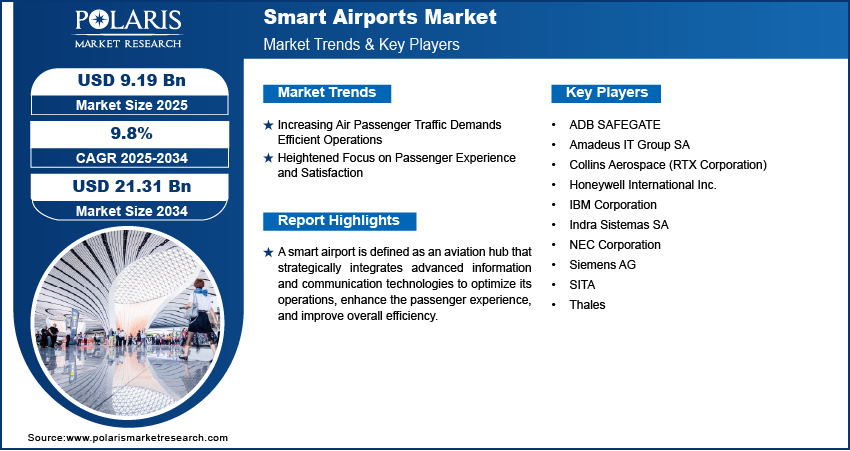Rising Demand for Seamless Passenger Experience Fuels Smart Airports Market

The global smart airports market is experiencing significant growth, driven by rapid technological advancements, increasing air passenger traffic, and substantial investments in airport infrastructure. With the integration of cutting-edge technologies such as artificial intelligence (AI), the Internet of Things (IoT), and biometric systems, airports worldwide are transforming into intelligent hubs that enhance operational efficiency and passenger experience.
Market Overview
The smart airports market size was valued at USD 8.39 billion in 2024. It is projected to grow from USD 9.19 billion in 2025 to USD 21.31 billion by 2034, exhibiting a CAGR of 9.8% during 2025–2034.. This growth is attributed to the rising demand for automation, improved security measures, and the need for efficient airport operations to accommodate increasing passenger volumes. Key factors propelling the market include the adoption of AI and machine learning for predictive analytics, the implementation of biometric authentication for seamless passenger processing, and the deployment of IoT devices for real-time monitoring and maintenance.
Market Segmentation
The smart airports market is segmented based on application, platform, airport model, and region.
By Application:
- AI/Machine Learning: Utilized for predictive maintenance, passenger flow analysis, and operational efficiency.
- Data Visualization: Enhances decision-making through real-time data representation.
- Anomaly Detection: Identifies irregularities in operations to prevent disruptions.
- Cyber Security: Protects airport systems from cyber threats.
- Asset/Resource Management: Optimizes the use of airport resources and assets.
By Platform:
- Hardware: Includes sensors, cameras, and other physical devices.
- Software: Comprises applications and programs for various airport functions.
- Data Management: Involves the storage, processing, and analysis of data collected from various sources.
By Airport Model:
- Airport 1.0 to 4.0: Represents the evolution from basic digitization to fully integrated and automated airport systems.
Regional Analysis
North America:
North America holds the largest share of the smart airports market, accounting for approximately 45.18% in 2023. The region's dominance is due to the presence of major international airports, high air passenger traffic, and early adoption of advanced technologies. Airports in the United States, such as Hartsfield-Jackson Atlanta International Airport and Dallas Fort Worth International Airport, have implemented RFID/NFC-based baggage tracking, automated immigration systems, and mobile applications to enhance passenger experience.
Europe:
Europe is the second-largest market for smart airports, driven by significant investments in modernizing airport infrastructure and a focus on sustainability. Airports like Munich and Manchester have adopted AI-powered platforms for real-time data analysis and resource management. The integration of smart trolleys with interactive tablets at Munich Airport exemplifies Europe's commitment to enhancing passenger services through technology.
Asia-Pacific:
The Asia-Pacific region is anticipated to witness the highest growth in the smart airports market, with a CAGR of 13.1% by 2030. Countries like China, India, and Singapore are investing heavily in airport modernization to accommodate the surge in air passenger traffic. India's Digi Yatra initiative, which uses facial recognition for seamless passenger processing, highlights the region's focus on digital transformation in aviation.
Middle East and Africa:
The Middle East and Africa smart airports market is expected to grow at a CAGR of 12.99% from 2025 to 2030. The construction of new airports and the expansion of existing ones in countries like the UAE and Saudi Arabia are driving the demand for smart technologies. The adoption of AI, automation, and predictive analytics is enhancing operational efficiency and passenger experience in the region.
Key Companies
Several prominent companies are leading the development and implementation of smart airport technologies:
- SITA (Switzerland): Specializes in air transport communications and IT solutions.
- THALES (France): Provides advanced technologies for aerospace, defense, and security.
- Siemens AG (Germany): Offers automation and digitalization solutions for airport infrastructure.
- Amadeus IT Group SA (Spain): Develops software solutions for airport operations and passenger services.
- IBM Corporation (US): Delivers AI and cloud computing services for airport data management.
- Cisco Systems Inc. (US): Provides networking and cybersecurity solutions for airport systems.
- Honeywell International Inc. (US): Offers automation and control solutions for airport facilities.
- L3Harris Technologies Inc. (US): Specializes in communication and electronic systems for aviation.
Conclusion
The smart airports market is poised for substantial growth as airports worldwide embrace digital transformation to enhance operational efficiency, security, and passenger experience. With continuous advancements in AI, IoT, and biometric technologies, the future of air travel is set to become more seamless, secure, and sustainable. Stakeholders in the aviation industry must collaborate and invest in smart solutions to meet the evolving demands of modern air transportation.
More Trending Latest Reports By Polaris Market Research:
Computer Aided Engineering (CAE) Market
Human Machine Interface Market
Network Function Virtualization Market
Digital Transaction Management (DTM) Market
- Art
- Causes
- Crafts
- Dance
- Drinks
- Film
- Fitness
- Food
- Jeux
- Gardening
- Health
- Domicile
- Literature
- Music
- Networking
- Autre
- Party
- Religion
- Shopping
- Sports
- Theater
- Wellness
- Travels

